An In-Depth Analysis of John Locke's Concept of Personal Identity
VerifiedAdded on 2022/11/24
|6
|1625
|317
Essay
AI Summary
This essay provides an analysis of John Locke's concept of personal identity, a cornerstone of his philosophical contributions. It explores Locke's belief that personal identity is rooted in consciousness and memory, arguing that these elements ensure psychological continuity even after physical death. The essay examines Locke's opposition to Cartesian views and his emphasis on experience and reflection as the sources of ideas. It contrasts Locke's perspective with that of Thomas Reid, who critiqued Locke's reliance on memory as a prerequisite for personal identity, highlighting Reid's concept of direct realism and his emphasis on consciousness being in the present. The essay concludes by summarizing Locke's theory and the debates surrounding it, including criticisms from his contemporaries and modern philosophers, while acknowledging Reid's significant role in these discussions.
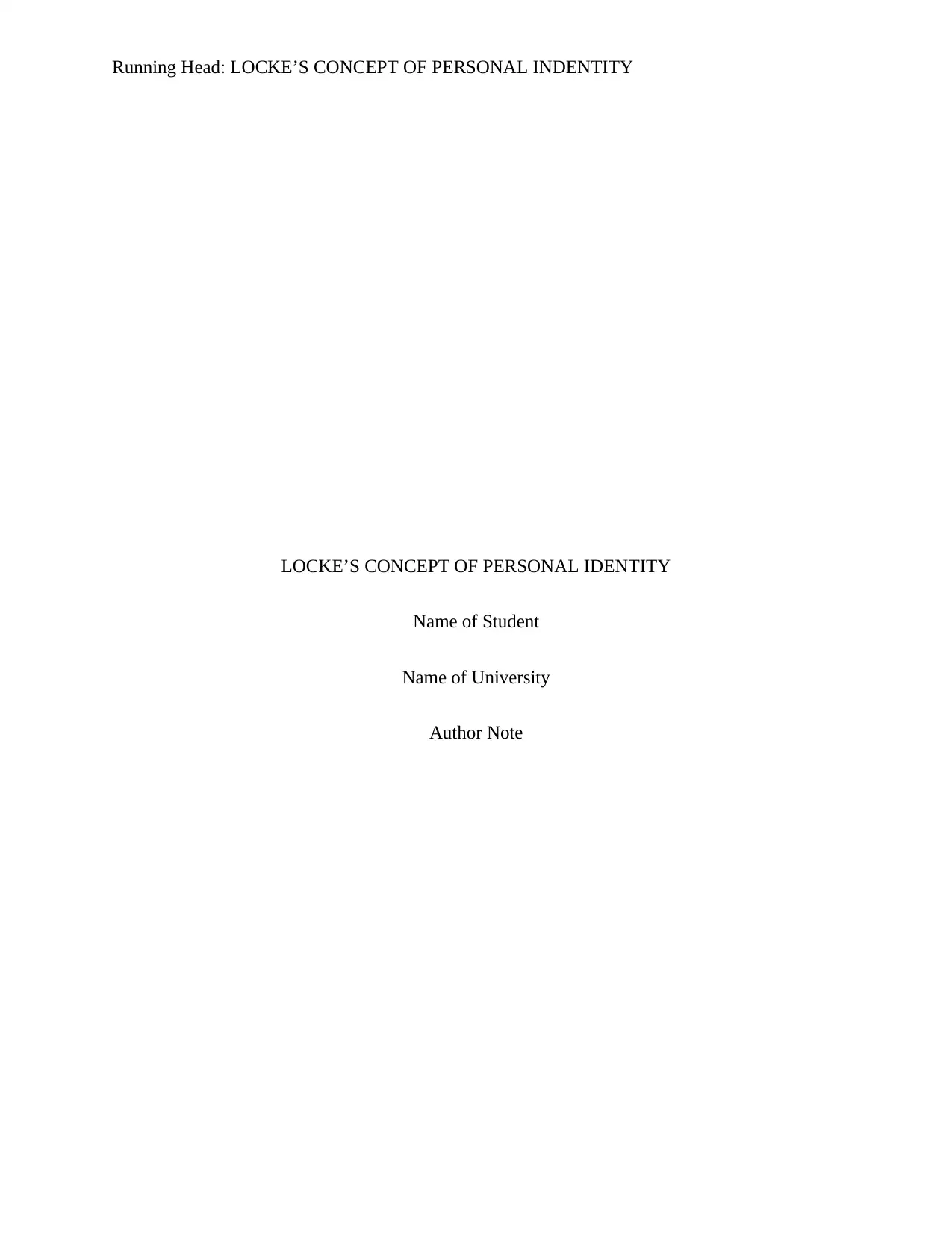
Running Head: LOCKE’S CONCEPT OF PERSONAL INDENTITY
LOCKE’S CONCEPT OF PERSONAL IDENTITY
Name of Student
Name of University
Author Note
LOCKE’S CONCEPT OF PERSONAL IDENTITY
Name of Student
Name of University
Author Note
Paraphrase This Document
Need a fresh take? Get an instant paraphrase of this document with our AI Paraphraser
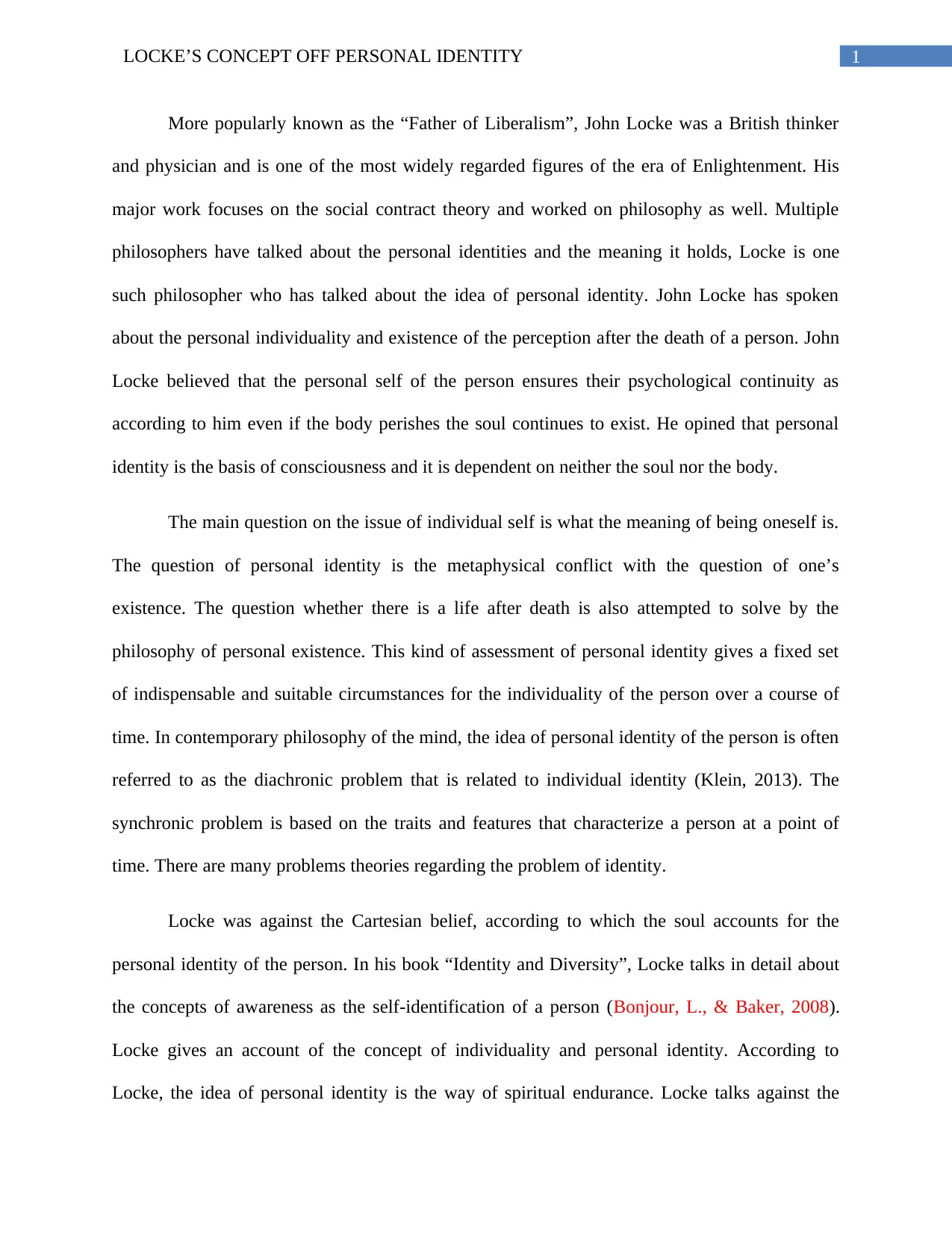
1LOCKE’S CONCEPT OFF PERSONAL IDENTITY
More popularly known as the “Father of Liberalism”, John Locke was a British thinker
and physician and is one of the most widely regarded figures of the era of Enlightenment. His
major work focuses on the social contract theory and worked on philosophy as well. Multiple
philosophers have talked about the personal identities and the meaning it holds, Locke is one
such philosopher who has talked about the idea of personal identity. John Locke has spoken
about the personal individuality and existence of the perception after the death of a person. John
Locke believed that the personal self of the person ensures their psychological continuity as
according to him even if the body perishes the soul continues to exist. He opined that personal
identity is the basis of consciousness and it is dependent on neither the soul nor the body.
The main question on the issue of individual self is what the meaning of being oneself is.
The question of personal identity is the metaphysical conflict with the question of one’s
existence. The question whether there is a life after death is also attempted to solve by the
philosophy of personal existence. This kind of assessment of personal identity gives a fixed set
of indispensable and suitable circumstances for the individuality of the person over a course of
time. In contemporary philosophy of the mind, the idea of personal identity of the person is often
referred to as the diachronic problem that is related to individual identity (Klein, 2013). The
synchronic problem is based on the traits and features that characterize a person at a point of
time. There are many problems theories regarding the problem of identity.
Locke was against the Cartesian belief, according to which the soul accounts for the
personal identity of the person. In his book “Identity and Diversity”, Locke talks in detail about
the concepts of awareness as the self-identification of a person (Bonjour, L., & Baker, 2008).
Locke gives an account of the concept of individuality and personal identity. According to
Locke, the idea of personal identity is the way of spiritual endurance. Locke talks against the
More popularly known as the “Father of Liberalism”, John Locke was a British thinker
and physician and is one of the most widely regarded figures of the era of Enlightenment. His
major work focuses on the social contract theory and worked on philosophy as well. Multiple
philosophers have talked about the personal identities and the meaning it holds, Locke is one
such philosopher who has talked about the idea of personal identity. John Locke has spoken
about the personal individuality and existence of the perception after the death of a person. John
Locke believed that the personal self of the person ensures their psychological continuity as
according to him even if the body perishes the soul continues to exist. He opined that personal
identity is the basis of consciousness and it is dependent on neither the soul nor the body.
The main question on the issue of individual self is what the meaning of being oneself is.
The question of personal identity is the metaphysical conflict with the question of one’s
existence. The question whether there is a life after death is also attempted to solve by the
philosophy of personal existence. This kind of assessment of personal identity gives a fixed set
of indispensable and suitable circumstances for the individuality of the person over a course of
time. In contemporary philosophy of the mind, the idea of personal identity of the person is often
referred to as the diachronic problem that is related to individual identity (Klein, 2013). The
synchronic problem is based on the traits and features that characterize a person at a point of
time. There are many problems theories regarding the problem of identity.
Locke was against the Cartesian belief, according to which the soul accounts for the
personal identity of the person. In his book “Identity and Diversity”, Locke talks in detail about
the concepts of awareness as the self-identification of a person (Bonjour, L., & Baker, 2008).
Locke gives an account of the concept of individuality and personal identity. According to
Locke, the idea of personal identity is the way of spiritual endurance. Locke talks against the
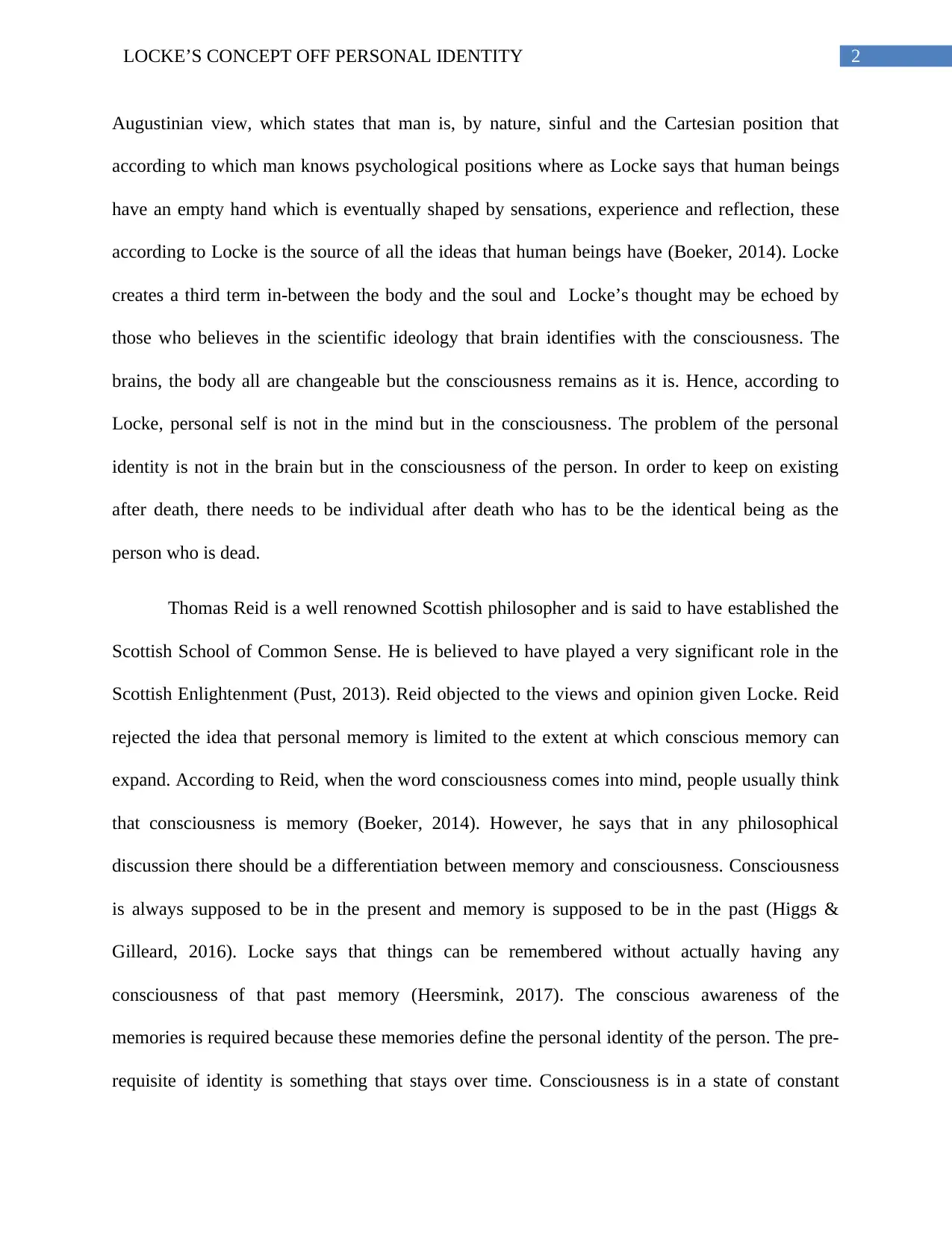
2LOCKE’S CONCEPT OFF PERSONAL IDENTITY
Augustinian view, which states that man is, by nature, sinful and the Cartesian position that
according to which man knows psychological positions where as Locke says that human beings
have an empty hand which is eventually shaped by sensations, experience and reflection, these
according to Locke is the source of all the ideas that human beings have (Boeker, 2014). Locke
creates a third term in-between the body and the soul and Locke’s thought may be echoed by
those who believes in the scientific ideology that brain identifies with the consciousness. The
brains, the body all are changeable but the consciousness remains as it is. Hence, according to
Locke, personal self is not in the mind but in the consciousness. The problem of the personal
identity is not in the brain but in the consciousness of the person. In order to keep on existing
after death, there needs to be individual after death who has to be the identical being as the
person who is dead.
Thomas Reid is a well renowned Scottish philosopher and is said to have established the
Scottish School of Common Sense. He is believed to have played a very significant role in the
Scottish Enlightenment (Pust, 2013). Reid objected to the views and opinion given Locke. Reid
rejected the idea that personal memory is limited to the extent at which conscious memory can
expand. According to Reid, when the word consciousness comes into mind, people usually think
that consciousness is memory (Boeker, 2014). However, he says that in any philosophical
discussion there should be a differentiation between memory and consciousness. Consciousness
is always supposed to be in the present and memory is supposed to be in the past (Higgs &
Gilleard, 2016). Locke says that things can be remembered without actually having any
consciousness of that past memory (Heersmink, 2017). The conscious awareness of the
memories is required because these memories define the personal identity of the person. The pre-
requisite of identity is something that stays over time. Consciousness is in a state of constant
Augustinian view, which states that man is, by nature, sinful and the Cartesian position that
according to which man knows psychological positions where as Locke says that human beings
have an empty hand which is eventually shaped by sensations, experience and reflection, these
according to Locke is the source of all the ideas that human beings have (Boeker, 2014). Locke
creates a third term in-between the body and the soul and Locke’s thought may be echoed by
those who believes in the scientific ideology that brain identifies with the consciousness. The
brains, the body all are changeable but the consciousness remains as it is. Hence, according to
Locke, personal self is not in the mind but in the consciousness. The problem of the personal
identity is not in the brain but in the consciousness of the person. In order to keep on existing
after death, there needs to be individual after death who has to be the identical being as the
person who is dead.
Thomas Reid is a well renowned Scottish philosopher and is said to have established the
Scottish School of Common Sense. He is believed to have played a very significant role in the
Scottish Enlightenment (Pust, 2013). Reid objected to the views and opinion given Locke. Reid
rejected the idea that personal memory is limited to the extent at which conscious memory can
expand. According to Reid, when the word consciousness comes into mind, people usually think
that consciousness is memory (Boeker, 2014). However, he says that in any philosophical
discussion there should be a differentiation between memory and consciousness. Consciousness
is always supposed to be in the present and memory is supposed to be in the past (Higgs &
Gilleard, 2016). Locke says that things can be remembered without actually having any
consciousness of that past memory (Heersmink, 2017). The conscious awareness of the
memories is required because these memories define the personal identity of the person. The pre-
requisite of identity is something that stays over time. Consciousness is in a state of constant
⊘ This is a preview!⊘
Do you want full access?
Subscribe today to unlock all pages.

Trusted by 1+ million students worldwide
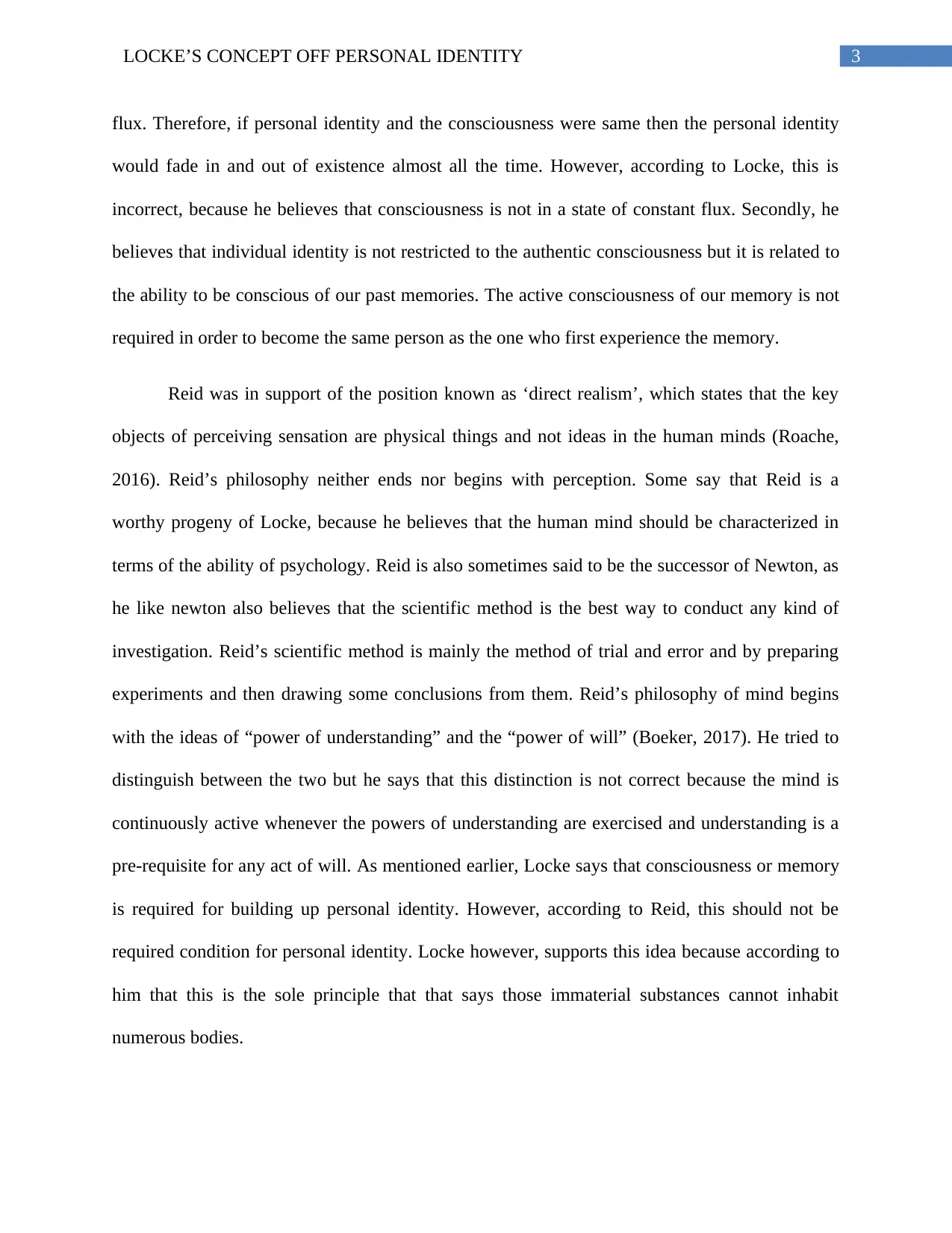
3LOCKE’S CONCEPT OFF PERSONAL IDENTITY
flux. Therefore, if personal identity and the consciousness were same then the personal identity
would fade in and out of existence almost all the time. However, according to Locke, this is
incorrect, because he believes that consciousness is not in a state of constant flux. Secondly, he
believes that individual identity is not restricted to the authentic consciousness but it is related to
the ability to be conscious of our past memories. The active consciousness of our memory is not
required in order to become the same person as the one who first experience the memory.
Reid was in support of the position known as ‘direct realism’, which states that the key
objects of perceiving sensation are physical things and not ideas in the human minds (Roache,
2016). Reid’s philosophy neither ends nor begins with perception. Some say that Reid is a
worthy progeny of Locke, because he believes that the human mind should be characterized in
terms of the ability of psychology. Reid is also sometimes said to be the successor of Newton, as
he like newton also believes that the scientific method is the best way to conduct any kind of
investigation. Reid’s scientific method is mainly the method of trial and error and by preparing
experiments and then drawing some conclusions from them. Reid’s philosophy of mind begins
with the ideas of “power of understanding” and the “power of will” (Boeker, 2017). He tried to
distinguish between the two but he says that this distinction is not correct because the mind is
continuously active whenever the powers of understanding are exercised and understanding is a
pre-requisite for any act of will. As mentioned earlier, Locke says that consciousness or memory
is required for building up personal identity. However, according to Reid, this should not be
required condition for personal identity. Locke however, supports this idea because according to
him that this is the sole principle that that says those immaterial substances cannot inhabit
numerous bodies.
flux. Therefore, if personal identity and the consciousness were same then the personal identity
would fade in and out of existence almost all the time. However, according to Locke, this is
incorrect, because he believes that consciousness is not in a state of constant flux. Secondly, he
believes that individual identity is not restricted to the authentic consciousness but it is related to
the ability to be conscious of our past memories. The active consciousness of our memory is not
required in order to become the same person as the one who first experience the memory.
Reid was in support of the position known as ‘direct realism’, which states that the key
objects of perceiving sensation are physical things and not ideas in the human minds (Roache,
2016). Reid’s philosophy neither ends nor begins with perception. Some say that Reid is a
worthy progeny of Locke, because he believes that the human mind should be characterized in
terms of the ability of psychology. Reid is also sometimes said to be the successor of Newton, as
he like newton also believes that the scientific method is the best way to conduct any kind of
investigation. Reid’s scientific method is mainly the method of trial and error and by preparing
experiments and then drawing some conclusions from them. Reid’s philosophy of mind begins
with the ideas of “power of understanding” and the “power of will” (Boeker, 2017). He tried to
distinguish between the two but he says that this distinction is not correct because the mind is
continuously active whenever the powers of understanding are exercised and understanding is a
pre-requisite for any act of will. As mentioned earlier, Locke says that consciousness or memory
is required for building up personal identity. However, according to Reid, this should not be
required condition for personal identity. Locke however, supports this idea because according to
him that this is the sole principle that that says those immaterial substances cannot inhabit
numerous bodies.
Paraphrase This Document
Need a fresh take? Get an instant paraphrase of this document with our AI Paraphraser
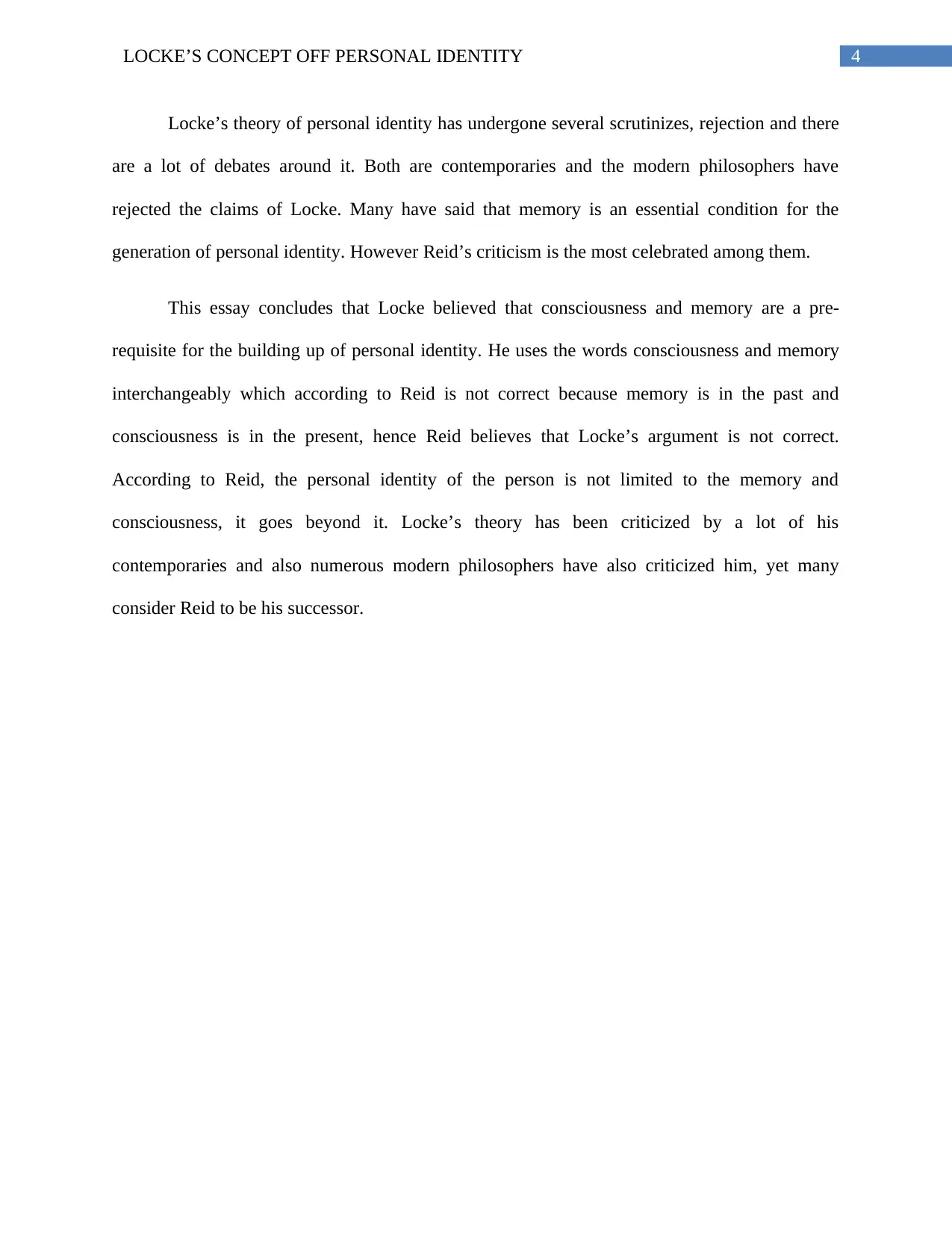
4LOCKE’S CONCEPT OFF PERSONAL IDENTITY
Locke’s theory of personal identity has undergone several scrutinizes, rejection and there
are a lot of debates around it. Both are contemporaries and the modern philosophers have
rejected the claims of Locke. Many have said that memory is an essential condition for the
generation of personal identity. However Reid’s criticism is the most celebrated among them.
This essay concludes that Locke believed that consciousness and memory are a pre-
requisite for the building up of personal identity. He uses the words consciousness and memory
interchangeably which according to Reid is not correct because memory is in the past and
consciousness is in the present, hence Reid believes that Locke’s argument is not correct.
According to Reid, the personal identity of the person is not limited to the memory and
consciousness, it goes beyond it. Locke’s theory has been criticized by a lot of his
contemporaries and also numerous modern philosophers have also criticized him, yet many
consider Reid to be his successor.
Locke’s theory of personal identity has undergone several scrutinizes, rejection and there
are a lot of debates around it. Both are contemporaries and the modern philosophers have
rejected the claims of Locke. Many have said that memory is an essential condition for the
generation of personal identity. However Reid’s criticism is the most celebrated among them.
This essay concludes that Locke believed that consciousness and memory are a pre-
requisite for the building up of personal identity. He uses the words consciousness and memory
interchangeably which according to Reid is not correct because memory is in the past and
consciousness is in the present, hence Reid believes that Locke’s argument is not correct.
According to Reid, the personal identity of the person is not limited to the memory and
consciousness, it goes beyond it. Locke’s theory has been criticized by a lot of his
contemporaries and also numerous modern philosophers have also criticized him, yet many
consider Reid to be his successor.
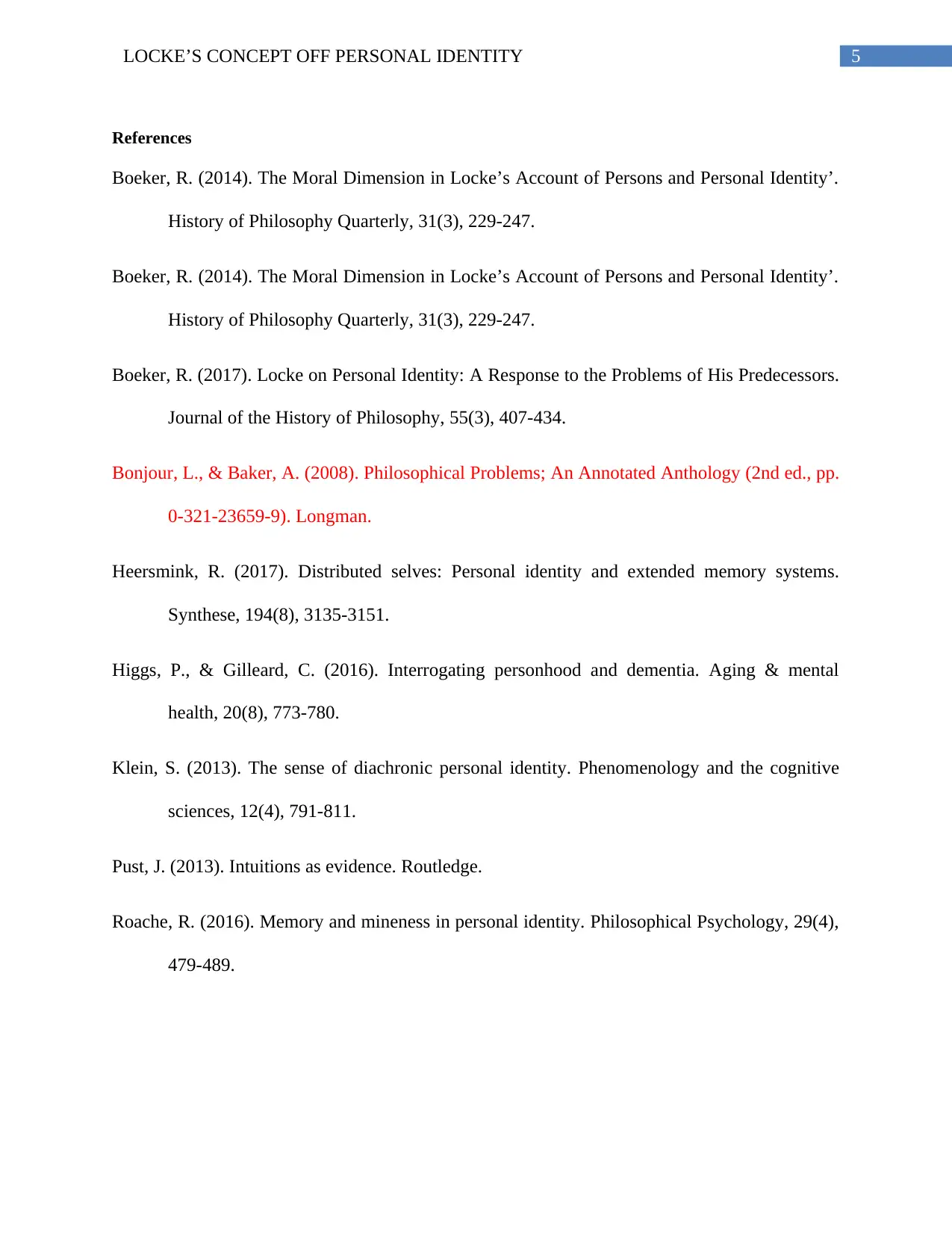
5LOCKE’S CONCEPT OFF PERSONAL IDENTITY
References
Boeker, R. (2014). The Moral Dimension in Locke’s Account of Persons and Personal Identity’.
History of Philosophy Quarterly, 31(3), 229-247.
Boeker, R. (2014). The Moral Dimension in Locke’s Account of Persons and Personal Identity’.
History of Philosophy Quarterly, 31(3), 229-247.
Boeker, R. (2017). Locke on Personal Identity: A Response to the Problems of His Predecessors.
Journal of the History of Philosophy, 55(3), 407-434.
Bonjour, L., & Baker, A. (2008). Philosophical Problems; An Annotated Anthology (2nd ed., pp.
0-321-23659-9). Longman.
Heersmink, R. (2017). Distributed selves: Personal identity and extended memory systems.
Synthese, 194(8), 3135-3151.
Higgs, P., & Gilleard, C. (2016). Interrogating personhood and dementia. Aging & mental
health, 20(8), 773-780.
Klein, S. (2013). The sense of diachronic personal identity. Phenomenology and the cognitive
sciences, 12(4), 791-811.
Pust, J. (2013). Intuitions as evidence. Routledge.
Roache, R. (2016). Memory and mineness in personal identity. Philosophical Psychology, 29(4),
479-489.
References
Boeker, R. (2014). The Moral Dimension in Locke’s Account of Persons and Personal Identity’.
History of Philosophy Quarterly, 31(3), 229-247.
Boeker, R. (2014). The Moral Dimension in Locke’s Account of Persons and Personal Identity’.
History of Philosophy Quarterly, 31(3), 229-247.
Boeker, R. (2017). Locke on Personal Identity: A Response to the Problems of His Predecessors.
Journal of the History of Philosophy, 55(3), 407-434.
Bonjour, L., & Baker, A. (2008). Philosophical Problems; An Annotated Anthology (2nd ed., pp.
0-321-23659-9). Longman.
Heersmink, R. (2017). Distributed selves: Personal identity and extended memory systems.
Synthese, 194(8), 3135-3151.
Higgs, P., & Gilleard, C. (2016). Interrogating personhood and dementia. Aging & mental
health, 20(8), 773-780.
Klein, S. (2013). The sense of diachronic personal identity. Phenomenology and the cognitive
sciences, 12(4), 791-811.
Pust, J. (2013). Intuitions as evidence. Routledge.
Roache, R. (2016). Memory and mineness in personal identity. Philosophical Psychology, 29(4),
479-489.
⊘ This is a preview!⊘
Do you want full access?
Subscribe today to unlock all pages.

Trusted by 1+ million students worldwide
1 out of 6
Related Documents
Your All-in-One AI-Powered Toolkit for Academic Success.
+13062052269
info@desklib.com
Available 24*7 on WhatsApp / Email
![[object Object]](/_next/static/media/star-bottom.7253800d.svg)
Unlock your academic potential
Copyright © 2020–2025 A2Z Services. All Rights Reserved. Developed and managed by ZUCOL.





